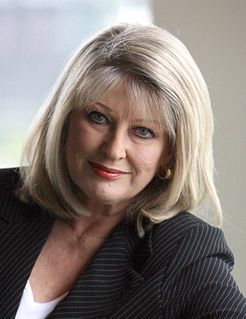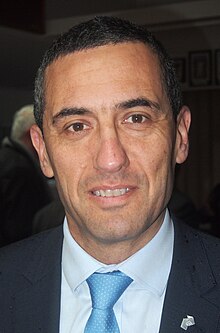
The Westminster system or Westminster model is a type of parliamentary government that incorporates a series of procedures for operating a legislature. This concept was first developed in England.
A question time in a parliament occurs when members of the parliament ask questions of government ministers, which they are obliged to answer. It usually occurs daily while parliament is sitting, though it can be cancelled in exceptional circumstances. Question time originated in the Westminster system of the United Kingdom, and occurs in other countries, mostly Commonwealth countries, who use the system.

The shadow cabinet or shadow ministry is a feature of the Westminster system of government. It consists of a senior group of opposition spokespeople who, under the leadership of the Leader of the Opposition, form an alternative cabinet to that of the government, and whose members shadow or mirror the positions of each individual member of the Cabinet. Their areas of responsibility, in parallel with the ruling party's ministries, may be referred to as a shadow portfolio. Members of a shadow cabinet have no executive power. It is the shadow cabinet's responsibility to scrutinise the policies and actions of the government, as well as to offer alternative policies. The shadow cabinet makes up the majority of the Official Opposition frontbench, as part of frontbenchers to the parliament.
Parliamentary opposition is a form of political opposition to a designated government, particularly in a Westminster-based parliamentary system. This article uses the term government as it is used in Parliamentary systems, i.e. meaning the administration or the cabinet rather than the state. The title of "Official Opposition" usually goes to the largest of the parties sitting in opposition with its leader being given the title "Leader of the Opposition".
In Canada, each political party with representation in the House of Commons has a House Leader who is a front bench Member of Parliament (MP) and an expert in parliamentary procedure. The same representation is found in the provincial and territorial legislatures. The House Leader is in charge of the party's day-to-day business in the House of Commons of Canada, and usually conducts negotiations with other parties on the conduct of bills and debates.

The Cabinet of Australia is the chief decision-making organ of the executive branch of the government of Australia. It is a council of senior government ministers, ultimately responsible to Federal Parliament.

The Parliament of Victoria is the bicameral legislature of the Australian state of Victoria that follows a Westminster-derived parliamentary system. It consists of the Queen, represented by the Governor of Victoria, the Legislative Assembly and the Legislative Council. It has a fused executive drawn from members of both chambers. The parliament meets at Parliament House in the state capital Melbourne. The current Parliament was elected on 24 November 2018, sworn in on 19 December 2018 and is the 59th parliament in Victoria.

Helen Lloyd Coonan is a former Australian politician who was a Senator for New South Wales from 1996 to 2011, representing the Liberal Party. She was a minister in the Howard Government, serving as Minister for Revenue and Assistant Treasurer from 2001 to 2004 and then as Minister for Communications, Information Technology and the Arts from 2004 to 2007.

The Australian Government, also known as the Commonwealth Government, is the national government of Australia, a federal parliamentary constitutional monarchy. Like other Westminster-style systems of government, the Australian Government is made up of three branches: the executive, the legislative, and the judicial.

In the Parliament of Australia, the position of Leader of the House is held by Peter Dutton since March 2021. This is the government minister responsible for the management of government business in the House of Representatives, including the order in which the Government's agenda is to be dealt with, tactical matters in reaction to impediments to such management, negotiation with the Opposition's counterpart about the order in which bills are to be debated, and the time allotted for debates.

Christopher Maurice Pyne is a retired Australian Liberal Party politician who served as Member of Parliament (MP) for Sturt from 1993 to 2019.

The Manager of Opposition Business in the House, sometimes called Opposition Leader of the House, is the member of the Australian Official Opposition Shadow Ministry responsible for negotiating with the Leader of the House regarding proceedings in the Australian House of Representatives. Among other things, the topics of negotiation are the order in which Government bills and other items of business are taken, the time allotted for debate, and the timing of Opposition business.
The Manager of Opposition Business in the House, also known as the Leader of Opposition Business in the House, is a member of the Shadow Cabinet of Queensland responsible for working with the Leader of the House on the management and scheduling of business in the Legislative Assembly. The holder of the post is ex officio a member of the Committee of the Legislative Assembly unless the position is designated to another Opposition member. The Committee has responsibility for the way the body is run. The Leader of Opposition Business is one of the few Opposition members to receive a government salary in addition to that earned as a member of Parliament.
In the Parliament of Australia, the Manager of Government Business in the Senate is a government member, usually a minister, whose responsibilities include negotiating with the Manager of Opposition Business in the Senate regarding proceedings in the Australian Senate. Among other things, negotiations would involve the order in which Government bills and other items of business, the time allotted for debate, and the timing of Opposition business. The position is distinct to that of Leader of the Government in the Senate and party whip, each of which also have deputy positions.
The Manager of Opposition Business in the Senate is the member of the Australian Official Opposition Shadow Ministry responsible for negotiating with the Manager of Government Business in the Senate regarding proceedings in the Australian Senate. Among other things, the topics of negotiation are the order in which Government bills and other items of business are taken, the time allotted for debate, and the timing of Opposition business.

The Leader of the Government in the Senate is the government's most senior cabinet minister in the Australian Senate and the main government spokesperson in the Senate. His or her Opposition counterpart is the Leader of the Opposition in the Senate.
The Leader of the Opposition in the Senate is a party office held by the Opposition's most senior member of the Shadow Cabinet in the Australian Senate, elected to lead the opposition party in the body. Though the leader in the Senate does not have the power of the office of Leader of the Opposition, there are some parallels between the latter's status in the lower house and the former's in the Senate. In addition to his or her own shadow ministerial portfolio, the leader has overarching responsibility for all policy areas and acts as the opposition's principal spokesperson in the upper house. The leader is entitled to sit at the table of the Senate, and has priority in gaining recognition from the President of the Senate to speak in debate. Another similarity is that the leader typically announces changes to opposition officeholders in the Senate, including shadow ministers, party leadership and whips. The leader also has some responsibility for appointing opposition senators to committees, a role filled by the Manager of Opposition Business and whips in the lower house. The current leader is Penny Wong. She is assisted by a Deputy Leader of the Opposition in the Senate, currently Kristina Keneally.
In the Parliament of Australia, the political parties appoint party whips to ensure party discipline, help manage legislative business and carry out a variety of other functions on behalf of the party leadership. Additional functions of the government party whips is to ensure that a sufficient number of government members and senators are present in the chamber to ensure passage of government legislation and measures and to prevent censure motions succeeding, and to ensure presence of a parliamentary quorum. Their roles in the chamber include tally votes during divisions, and arranging pairs which affects the ability of members and senators to leave parliament during sittings, as well as the entitlement to be absent during divisions.

In Australian federal politics, the shadow cabinet is the opposition's equivalent to the federal cabinet. It comprises the most senior figures within the opposition, headed by the leader of the opposition as the counterpart to the prime minister of Australia.
The Leader of Government Business in the South Australian Legislative Council, commonly known as Leader of the Council, is responsible for the management of government business in the upper house of the Parliament of South Australia. The office is held by a member of the Cabinet of South Australia.










